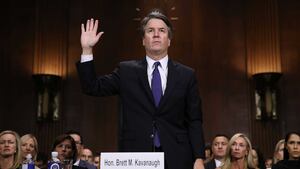This article is part of an Elections 2018 package for Beast Inside members only. Join now to enjoy our special midterms coverage, including an exclusive elections poll and more!
Enthusiastic Republicans are making a strong surge in the final weeks of the midterms, and it will probably be enough to hold or even grow their Senate majority. But come the morning of November 7, Democrats are likely to take control of the House of Representatives. And such an outcome could make the current dysfunction and bitterness in Washington D.C. look quaint.
Not only will the executive and legislative branches of government be pitted against one another, as will the House and the Senate, but internal divisions will almost surely pop up within the Democratic Party itself as it grapples with how to wield its new powers. After all, jumping into the majority with an opposing president and a fired-up base is no cake-walk. Just ask Republican leaders who were there in 2010.
Having had a front-row seat to that dynamic the last time a party retook the House, let me offer some things that the country and Democrats could expect going forward.
Committees & Investigations
The members who will become quickly known will be the chairs of the committees investigating the president. The House Oversight Committee will become the epicenter of resistance, as it was for Republicans under President Obama. That puts Elijah Cummings (D-MD) in the spotlight. But the House Judiciary Committee, where impeachment hearings could be held, will play a role too, giving its possible next chair, Jerry Nadler (D-NY), immense power and responsibility.
House Minority Leader Nancy Pelosi has said she expects all ranking members to become chairs. But with a major influx of new members, she’ll face pressure to elevate newer (younger) faces. Cummings was first elected in 1996 and Nadler in 1992 after all. It’s unlikely they will go anywhere in the next Congress. But expect the steering committee to look for a opportunities to make changes below them, and for leadership to expand its decision-making table to include freshman and sophomore members.
Reps. Barbara Lee (D-CA) and Linda Sanchez (D-CA) have already announced their intention to succeed Rep. Joseph Crowley (D-NY) as Democratic Caucus Chair. If Sanchez were to win, that may open some musical chairs at the Committee Chair level. This may also increase pressure for geographical diversity, with New York City and California overpowering the leading positions. The key question for Democrats will be setting realistic expectations and prioritizing oversight. That’s easier said than done. Young liberals will want scalps and want them quick. Just as Republicans were pressed to repeal Obamacare overnight, Democrats will be expected to investigate virtually every scandal, even if it’s overblown, and get President Trump moving toward the exits.
Gridlock
At the outset of the Trump presidency, there was speculation that he would be willing to work with Democrats to make deals, especially given that he is not much of an ideologue. The Trump-Chuck Schumer New Yorker bromance was a thing. But there is little merit to that argument now. Trump is always igniting his base and heading toward 2020, so he will see little upside to striking deals.
It is already very unlikely that a president can pass big-ticket legislation after the first two years of his term. In a divided government, it is nearly impossible. The President’s best shot at any last whiffs of legislation would be in the lame duck when Congress must consider funding the government beyond the current December 7 deadline. If he’s going to ‘build the wall’ or anything else, it would have to happen here. But there’s a reason it didn’t happen already. There has already been broad disagreement over the president’s spending priorities, especially from conservative Senators and fiscal hawks. It will be tough for him to achieve much in a lame duck.
Instead, it is likely that we will move into perpetually funding the government by continuing resolutions—i.e. keeping current spending levels in place—and shutdown fights will continue to be a thing, perhaps with renewed energy. One place where there is likely not to be a showdown, however, is over the debt ceiling. Trump has seemingly no problem when it comes to wracking up a bill and Democrats—having spent years decrying the use of the debt ceiling as a negotiating tool—will be hard-pressed to turn around and do just that.
Pelosi has indicated she’d like her caucus to take up background check legislation, campaign finance reform and immigration policies to protect Dreamers. Most of this is pure messaging, although immigration legislation could peel away Republican votes. However, the Mueller report will likely be released by the end of 2018, sucking all the oxygen out of the caucus room. Leadership policy agendas have a tendency to get overridden by the politics of the day and while Pelosi has said she doesn’t want a “pound of flesh club,” that is a rather idealistic view of the upcoming Congress.
Judges
One area where things will likely remain smooth sailing for Republicans will be with respect to the confirmation of conservative judges. Assuming that the Senate remains in GOP hands (which seems likely), Democrats will be powerless to stop Trump from stacking the judiciary. And because there will be little other legislating to do with the House being run by Democrats, judges will remain priority number one and move swiftly through the chamber. For Democrats, Harry Reid’s decision to get rid of the filibuster for judicial nominees will look even worse in hindsight.
Leadership Challenges
Nancy Pelosi and Chuck Schumer currently have a firm hold on their positions atop their respective conferences. But they have both been largely irrelevant in the minority, ceding opposition leadership to outside groups or the media. If either one is to gain majority status, there will be high performance expectations almost immediately. Expectations they probably can’t meet.
Rank-and-file Democrats surely have learned some lessons from the Republican majority. It only takes a small band of them voting as a bloc to control the floor and thus leadership. The opening for a progressive answer to the Freedom Caucus would be a mile wide. Dozens of Democrats have already declined to publicly endorse Pelosi as their next Speaker. They’ll likely fall in line for the leadership vote because of the difficulty of mounting a successful challenge against a powerful fundraiser and leader fresh off of a major victory. But when Pelosi is re-elected Speaker, it will also likely be for no more than two years, making way for fresh leadership.
Who that fresh leadership will be is a real question though. Democrats suffer from a short bench of known members of Congress. Rep. Beto O’Rourke (D-TX) lingered in near anonymity for six years before becoming a darling of the left. These are the consequences of the House minority. Expect that void to be filled by up-and-comers if they are in the majority. Adam Schiff (D-CA) and Eric Swalwell (D-CA) will naturally rise by virtue of their prominence in the Russia investigation. But previously unheard-of Representatives will draw a brighter spotlight and put the aging leadership on its heels.
2020
A lot of Democratic Senators have ambitions to run for president. Whether it’s Sens. Cory Booker, Amy Klobuchar, Elizabeth Warren, Kamala Harris, Kirsten Gillibrand, Bernie Sanders or Tim Kaine, the campaign will begin on Wednesday, November 7. This means that senators will be on the road, missing votes and hearings, and when in D.C., preening for national coverage. This will have little impact if Democrats remain in the minority, as expected. But if they pull a major upset and move to the majority, expect these senators to jockey for spots that help raise their profile and put them in a position to lead the opposition to the president.
In this case, 2020 politics would take root in Washington rather than Des Moines or Manchester. The road trips will be delayed as congressional politics steals the attention of the media and senators. Mitch McConnell, a brilliant tactician, will surely force Democrats to take difficult votes that divide the party. This will create an opening for outside candidates or governors to emerge in the early states, but media oxygen will be hard to come by.
Congressional Democrats have so far been mostly onlookers of the Trump presidency. Largely irrelevant. Yes, they’ve caused some headaches but not many. In fact, much of their congressional action has arguably been self-defeating. By holding one gavel, they will finally be a protagonist but with little power, and thus be the proverbial dog who caught the car.








